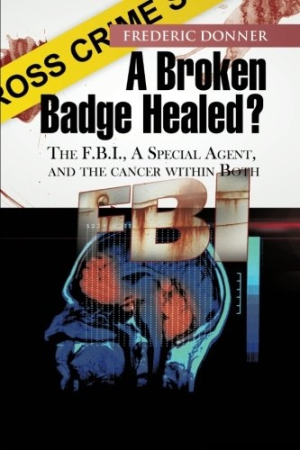A Broken Badge Healed?
The FBI, a Special Agent, and the Cancer within Both
Ex-agent says the FBI went astray when it began chasing terrorists rather than criminals.
Author Frederic Donner, an FBI veteran who was forced to accept a medical disability leave when he was diagnosed with brain cancer, is a remarkable man. Instead of penning a self-congratulatory memoir on how he courageously defeated the disease that ravaged his body, he uses his experience to thoughtfully compare his cancer to the cancer he perceives within the FBI, and he offers positive steps to cure both bodies.
In A Broken Badge Healed?, Donner’s critique of the organization he served so well for so long is presented forthrightly, without rancor or bitterness. Clearly, he has a deep affection for the men and women with whom he worked and for the FBI as a vital organization. He is not a whistle-blower or a disgruntled former agent attempting to right wrongs done to him.
Donner’s principle criticism of the FBI is that it has been led astray from its primary mission as a police agency. Today, it has become largely an anti-terrorism body, having lost its ability to simultaneously carry on different investigations into various types of criminal activity, asserts the author. In addition, employees of the Bureau are assigned to anti-terrorism work without regard to whether they are suited for it. While not making this judgment personal, Donner notes this alteration of the FBI’s mission was based on a deliberate decision made by FBI director Robert Mueller pursuant to a directive from the then president George W. Bush, in response to the attacks on September 11, 2001.
Donner details how the FBI is burdened by its own bureaucracy, duplicating administrative fieldwork with additional layers of requirements generated by Bureau headquarters in Washington. Too many agents, says Donner, spend too much time pushing around too much paper.
New recruits also come under fire from Donner. Too many new agents belong to what Donner calls the “me generation” and are unwilling to take chances to do good work for fear of being reprimanded by superiors.
Donner writes well and is clearly passionate about his cause. But wading through page after page of description of bureaucratic detail does not make for riveting narrative. The volume likely will appeal more to those interested in public administration than to the average person who is already convinced the federal government suffers from bureaucratic gridlock.
The author believes that an informed citizenry will be able to apply pressure from the outside in order to bring about change in the Bureau. But many people today believe that the federal government does not respond to citizens’ opinions. Donner notes that the last few directors of the FBI have been lawyers. While Donner himself is a law-school graduate, he believes the Bureau would be improved by having a former city police chief as director. President Obama just nominated a new director of the FBI, Jim Comey, for a ten-year term—Comey is a lawyer.
A Broken Badge Healed? is Donner’s second book. His first was Zen and the Successful Horseplayer. If a reader can check his or her general skepticism about the federal government, there is much that is refreshing and honest in Donner’s latest offering.
Reviewed by
John Senger
Disclosure: This article is not an endorsement, but a review. The publisher of this book provided free copies of the book and paid a small fee to have their book reviewed by a professional reviewer. Foreword Reviews and Clarion Reviews make no guarantee that the publisher will receive a positive review. Foreword Magazine, Inc. is disclosing this in accordance with the Federal Trade Commission’s 16 CFR, Part 255.

